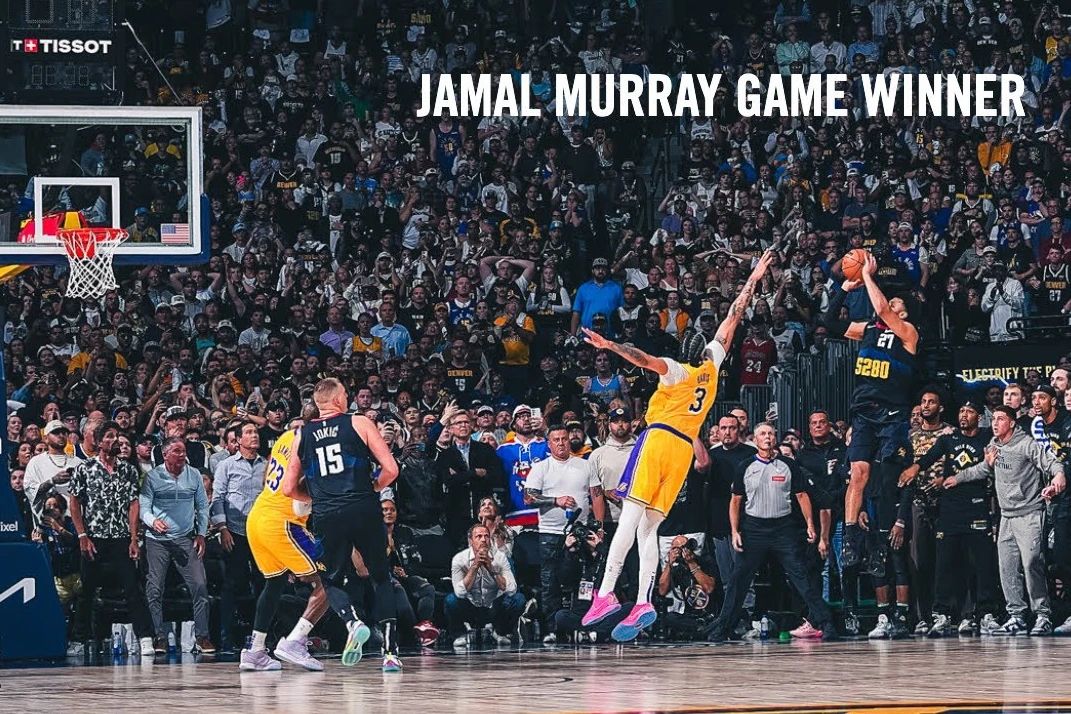The Nuggets and Murray have finally completed an early extension: 4 years, $208 million.
This long-overdue contract extension puts an end to all of the Nuggets’ offseason moves this year.
Does Murray deserve a max contract? Is $200 million overpaid?
In my view, the Nuggets truly had no choice. Delaying the signing until now shows they had no alternative.
Of the $200 million, $100 million is a reward for him bringing the Nuggets their only championship trophy in history, and the other $100 million is payment for his performance in the next few years.
The Nuggets, who were just one win away from the Western Conference Finals, made moves this summer that left many shaking their heads. They let go of Kentavious Caldwell-Pope, traded Reggie Jackson, and brought in Russell Westbrook and Dario Šarić for less than $9 million combined.
They even facilitated a six-team trade that helped the Mavericks and Warriors: the Mavs landed Klay Thompson, while the Warriors got Li Kaier and Buddy Hield.
In the past two postseasons, the Nuggets relied heavily on their first-round draft picks, but this year’s selection, Holmes, suffered a severe injury in the first Summer League game—he had heel surgery and is likely out for the entire season. Why? Because a rookie’s ability to integrate into the team depends crucially on summer training, preseason camps, and exhibition games.
The Nuggets have mixed feelings about Murray: he was crucial for the championship, especially after his major injury, but his performance last season was underwhelming.
Sometimes, Murray looks like a star in peak form; other times, he seems unworthy of being Jokic’s right-hand man. It’s as if he exists solely to play against the Lakers—like sweeping them 4-0 in the championship year or hitting a buzzer-beater with 3.6 seconds left in Game 5 this year. But he also bore significant responsibility for the loss to the Timberwolves: he scored just 25 points in the first two games, putting the Nuggets in a 0-2 hole; after taking a 3-2 lead, he scored only 10 points in Game 6; and though he dropped 30+ in the Game 7 loss, it was too late.
Murray plays like a 30-something veteran whose form is declining, but he’s only 27—the prime of a basketball player’s career. It’s hard for the Nuggets to readily agree to give him a max contract in advance.
Murray has always been full of such contradictions. On one hand, he’s considered one of the most overrated stars; on the other, he’s one of the most underrated players.
B/R once ranked the most overrated players, with Murray at No. 4. But look at the list: No. 1 is Jonathan Kuminga, No. 2 is Jalen Green of the Rockets, No. 3 is Miles Bridges, and No. 5 is Aaron Gordon of the Magic. All four are young players, and their “overrated” label stems from questions about whether they can fulfill their potential.
Only Murray is a proven, championship-winning player in his prime who’s dropped 50 points in a single game. In NBA playoff history, only 8 players have scored 50+ points more than twice, and Murray is one of them. From this perspective, he should top the list of most overrated players.
The biggest contrast is that Murray seems unstoppable with Jokic on the court, but he can’t carry a high-powered offense alone when Jokic is off.
Murray played in the Olympics this year. Before the Games, he was negotiating an extension with the Nuggets but couldn’t reach a deal, so he went to Paris without resolving the contract. In theory, Team Canada should have been stronger with Murray, but he felt like an outsider. Asked to lead the second unit, he couldn’t deliver: 6 points per game over 4 games, shooting 2-of-14 from deep.
Meanwhile, Jokic led Serbia to a near-upset of the U.S. team, going toe-to-toe until the final moments. That’s the fundamental difference between them.
Murray isn’t a natural leader; he doesn’t exude charisma. But paired with Jokic, they’re a perfect fit—like a screw and its hole. Jokic does it all, including handling the ball and distributing, which masks Murray’s limitations as a non-point guard. By Jokic’s side, Murray’s value is maximized.
Dragging the extension talks until long after the Olympics was a last resort for the Nuggets. On one hand, they couldn’t find a better replacement for Murray; on the other, they didn’t want to disrupt the existing chemistry. The Nuggets wanted to include a clause about full guarantee in the final year as a constraint, but Murray didn’t agree.
The Nuggets have always aimed to leverage the low salaries of young players, so they don’t hand out big contracts lightly. Their core is Jokic, Murray, and Michael Porter Jr., while Aaron Gordon is paid like a role player. Year after year, they let veterans walk—Bruce Brown last year, Caldwell-Pope this year—truly because they don’t want to cross the second luxury tax threshold, which would limit their future flexibility. The Nuggets’ payroll for next season is $184 million, ranking 7th, already over the first threshold.
The new luxury tax rules are a game-changer, preventing most contenders from building superteams. So far, only the Suns, Timberwolves, Bucks, and reigning champion Celtics have crossed the line. As a small-market team, the Nuggets are even more cautious—protecting their foundation is paramount.
This works in Murray’s favor: $100 million is his championship reward, and the other $100 million is his value for the next four years. $27 million per year is fair, right?
